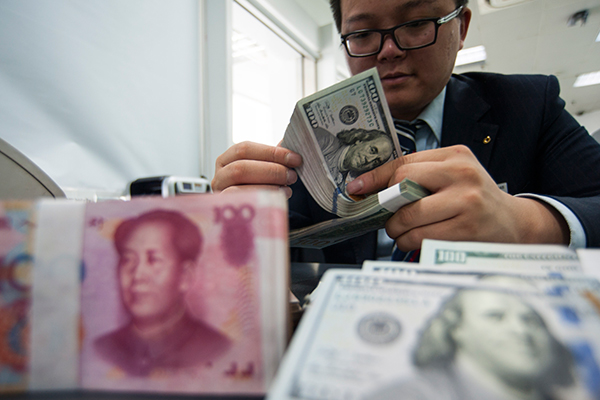 |
|
An employee at a bank counter in Nantong, Jiangsu province, counts renminbi and dollars. [Photo/China Daily] |
A net $604 million has flowed in via an RQFII program in the January-July period
Revived appetite for emerging market stocks and bonds is starting to include China-and even its currency, the?renminbi.
The China Asset Management Company has seen more inflows into equity funds that invest offshore yuan into mainland equities since Britain's June 23 vote to leave the European Union.
CSOP Asset Management Ltd had its strongest inflows in 14 months in June to an exchange-traded fund that pumps yuan held abroad into China's sovereign bonds.
A net $604 million has flowed into China via the Renminbi Qualified Foreign Institutional Investors program in the first seven months, versus an outflow of $4.1 billion last year, Z-Ben Advisors estimates. Inflows into stocks have dominated this year at about $880 million.
"People are looking again at the emerging markets, which were undervalued, China for example," said Freddie Chen, Hong Kong-based managing director at China Asset, which has used just over half of its RQFII quota of 21.8 billion yuan ($3.3 billion) and allocated 80 percent to equity with the rest in fixed income. "We have seen a lot more interest" after the Brexit vote highlighted developed nation risks, he said.
The inflows will help slow the decline in China's foreign-exchange reserves and support the yuan, which dropped 3.7 percent in the past 12 months in Asia's worst performance. They may also add fuel to a rally in the Shanghai Composite Index, which is up 5.3 percent this quarter but still down 13 percent for 2016. While the nation's sovereign bond yields have plunged this year, they are still high compared with negative rates in Japan and Europe, prompting global funds to boost holdings by the most in two years in June.
"Our overseas clients have shown more interest in RQFII lately," said Melody He, head of exchange-traded funds and index solutions in Hong Kong at CSOP, which said on Aug 11 that its China 5-Year Treasury Bond ETF tripled assets to 2 billion yuan this year. "The two main reasons behind it are falling yields in developed markets and a stabilizing yuan."
Morgan Stanley wrote in an Aug 20 note there could be a "powerful" catchup rally in Chinese stocks as global investors are again targeting developing nations. While the Shanghai benchmark climbed 16 percent from a low on Jan 28, that trails a 24 percent rise for the MSCI Emerging Markets index. The best-performing bond fund in China has also said government economic stimulus means money may flow from onshore corporate debt into stocks.
Since RQFII licenses were first awarded in 2011 to promote the global use of the yuan, official data show China has granted 508.4 billion yuan in quotes to 169 financial institutions. The products suffered heavy redemptions since the currency's devaluation last August.
This year, China offered a quota of 250 billion yuan to US institutions, which will lead to more demand for yuan products, according to Li Liuyang, a senior analyst at Bank of Tokyo-Mitsubishi UFJ China Ltd.
One thing that could derail the momentum is a stronger dollar. Federal Reserve Vice-Chairman Stanley Fischer on Aug 21 signaled that a 2016 rate hike is still under consideration. The yuan, which closed at 6.68 per dollar on Friday (Sept 2), is forecast to weaken to 6.75 by year-end, according to a survey of economists by Bloomberg. Yields on the nation's 10-year sovereign bonds have fallen 10 basis points this year to 2.72 percent. That compares with a 50-basis-point drop in average yields for the Bloomberg Emerging Market Local Sovereign Index.
Bloomberg
